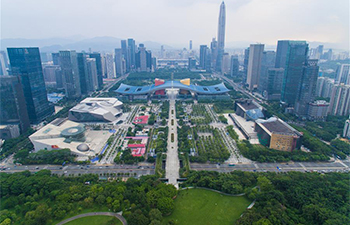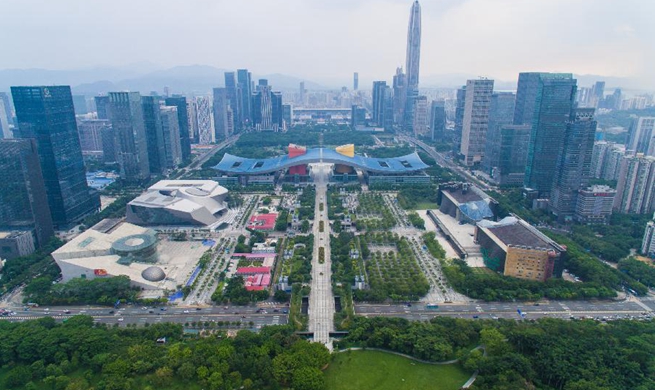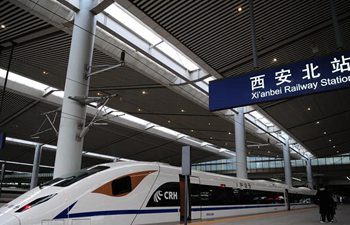TRIPOLI, Nov. 26 (Xinhua) -- Many Libyans feel frustrated over the repeated failures of political factions to amend the political agreement, agreeing that a state of despair and frustration was caused by the procrastination of the political parties to end successive crisis of Libya.
Many Libyans spoke of their stance on the recent failure of the negotiations to amend the political agreement.
Ibtisam Al-Tarhouni, a 28-year-old law student at the University of Tripoli, believes that politicians have not achieved their interests in recent negotiation rounds.
Therefore, they rejected any efforts for amendment of the agreement and adopt a UN road map to resolve the crisis.
"Most of the participants in the amendments to the agreement, whether from the House of Representatives or the Higher Council of State, believed that the amendment would ensure their continuation on power in Libya.
However, they felt that the amendment would exclude some individuals and reduce powers of some parties. Their hopes have dissipated and the state of division returned," she explained.
Al-Tarhouni pointed out that all Libyans agreed that the reason for the continued political division is the existing parties, "which seek to continue to be in power, and unfortunately caused our frustration and made the solution seem far."
Al-Tarhouni considered that all alternatives to dialogue are scenarios of war and the continuation of chaos, "because there is no alternative to dialogue for all Libyans. They must learn that compromise for the sake of the country is a moral that should be adopted at these critical times."
Special Representative of the UN Secretary-General in Libya, Ghassan Salame, in September proposed and action plan for Libya that includes amendment of the current UN-sponsored political agreement, holding a UN-sponsored national conference for all of Libya's political factions, adopting a constitution, and finally election of a president and a parliament.
Representatives of Libya's eastern-based Parliament and Tripoli-based Higher Council of State have recently held UN-sponsored negotiation meetings in Tunisia to amend the agreement.
The House of Representatives on Tuesday approved a UN-proposed amendment.
However, the rival Higher Council of State rejected the amendment, announcing possibility of holding elections within six months to appoint a government of technocrats.
Libyan official TV journalist Waleed Mohammed said that the repeated failure of the negotiations to amend the political agreement "makes a large segment of Libyans in a state of discontent."
The UN-proposed formula states that the Presidential Council and the Government will continue to perform their functions until presidential elections are held, and that the Presidential Council shall consist of only one president and two deputies.
Ali Sweih, member of the Higher Council of State, stressed that the most important disagreement in the amendment of the political agreement is about the authority of the House of Representatives to choose the new presidential council.
"When we met in a formal session to vote on the proposals of amendment that we received from the UN envoy Salame, the biggest disagreement among the members of the Council was the House of Representatives authority to select members. This is an encroachment on our right to nominate Presidential Council members," Sweih told Xinhua.
"If the House of Representatives will do everything according to the proposal, then what is the role of the Higher Council of State in the agreement and implementation of its provisions?"
Sweih noted that the rejection of the Council "does not mean boycotting the rounds of the amendment. The Council seeks a balance with the House of Representatives in sharing tasks entrusted to them under Article 12 of the additional provisions of the agreement, which stipulates that the amendment must be authorized by the House of Representatives and the Council."
Sweih stressed the Council's commitment to dialogue and political solution "to bring together all parties. We sense of frustration of the people due to the failure to end the political division, which caused great problems at all levels."
House of Representatives member Abdalmen'em Balkour expects the House of Representatives and the Council to agree on the amendment of the agreement, "as the situation does not tolerate any political maneuvers or procrastination from any party."
"When the House of Representatives and the Council sat on the dialogue table despite the complete differences in their respective political visions, the aim was to end the crisis and overcome differences to accelerate the process of unifying institutions and solving the problems of the Libyans, and pay attention to the dangers that beset our country from all directions," Balkour told Xinhua.
Balkour called for a specific timetable to discuss all outstanding issues in the agreement, "and not to compromise and waste time, because we lost a lot and we must compensated, in light of the continued chaos and lawlessness."

















